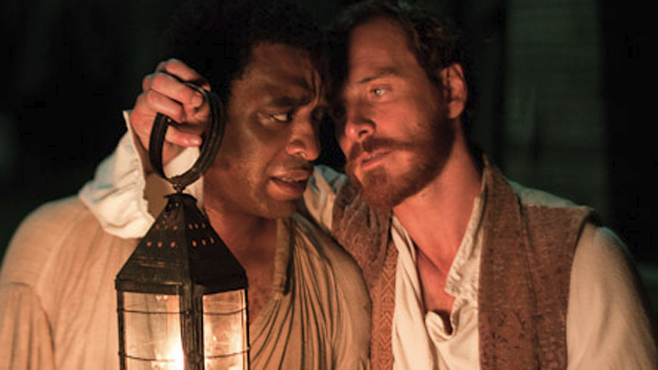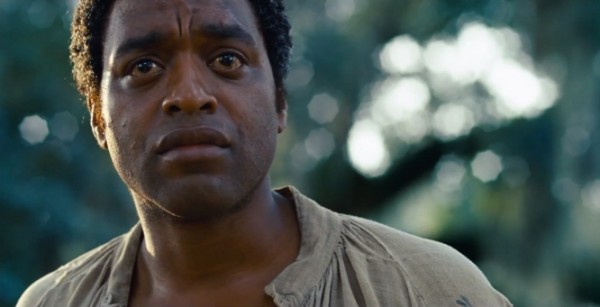2013, 134 mins, 15, Dir. Steve McQueen, starring Chiwetel Ejiofor, Benedict Cumberbatch, Michael Fassbender, Lupita Nyong’o, and Brad Pitt

Exactly one year ago this month audiences were treated to the flamboyant and horribly funny Django Unchained. Up to that point it was one of the most realistic depictions of American slavery ever produced, and was lauded as such. While it remains a truly excellent film, there was always a lingering sense that the definitive film on slavery was yet to be made, one that did away with a revenge western plot, that avoided deliberate humour, something that showed the N-word to be a tangible, terrible, harsh, historical term, as opposed to a mere flippant remark.
It is extremely likely that the definitive film on slavery is 12 Years a Slave. It is, quite simply, astonishing.
Steve McQueen’s film is adapted from the memoirs of Solomon Northup (Chiwetel Ejiofor), a free-born African-American who was kidnapped in 1841 and, as the title suggests, sold into slavery. Northup endures beatings, attempted murder and psychological attack under the control of Edwin Epps (Michael Fassbender), a sadistic and cruel plantation owner. As an audience we rail against the injustice both of Northup’s incarceration and of the entire system of slavery, as the brutality of a very dark period of American history manifests itself onscreen.

It comes as no surprise that 12 Years a Slave is, at times, very difficult to watch. Within minutes of finding out about his kidnapping, Northup protests that he is a free man, and is promptly beaten with a wooden object so hard that it smashes into pieces. The entire beating happens in a single shot; we are given no respite from what is happening. McQueen’s direction, with Sean Bobbitt’s cinematography, is unsparing. Frequently such scenes are presented in very long takes, including one genuinely shocking act of savage violence at the end, effectively the dramatic climax of the story. McQueen, as an Englishman, makes sure we know that he is making a very different film about slavery – a film that American directors have ultimately failed to make over the years.
12 Years a Slave is inevitably driven by its characters, and the impeccable casting ensures a wide array of impressive performances. There isn’t one instance of bad acting, a huge relief given the sobering nature of the source material. Ejiofor’s performance here is undoubtedly his best, with much suggested through his facial expressions; his silent articulations of pain and desperation are difficult to forget. Michael Fassbender, a frequent presence in the films of Steve McQueen, is strikingly hostile and sadistic as Edwin Epps. Epps’ cruelty and instability leads not just to physical punishment of his slaves but also to sexual assault, and Fassbender is frighteningly convincing. So too is Lupita Nyong’o. The suffering and torment of her character Patsey is brilliantly conveyed, and she is deservedly gaining awards recognition for what is (surprisingly) her feature film debut.

The role of the music is also key to the film’s stratospheric success as a piece of drama. In some senses, it acts as a metaphor for the story itself. Hans Zimmer produces an excellent score which on occasion grows metallic, disturbing, almost modern, particularly when Northup is almost killed by racist farmhands. Yet that is offset by the stirring sound of the Negro spirituals sung by the slaves. The song ‘Roll Jordan Roll’, written especially for the film, is sung at a slave funeral, with Northup eventually joining with his fellow prisoners as part of a collective identity. The message is that even amidst the haunting oppression of the white slavemasters, even in darkness, there is hope.
12 Years a Slave is nothing short of a modern masterpiece. Aside from its intelligent direction, mature and balanced performances, and atmospheric music, a great deal of its impact can be assessed by the emotions it arouses. I felt genuine shock at the treatment of the slaves that superseded mere intellectual empathy, revulsion at the sadistic practices of Fassbender’s plantation owner, and a righteous outrage at the historical perpetrators of these terrible atrocities. In other words, the film achieves a rare level of catharsis, one that left me speechless long after the final shot had elapsed. Nothing in recent years has ever so much deserved to clean up at the Academy Awards. 12 Years a Slave is upsetting and exhausting. But it is tremendous proof that the quality of cinema has not declined with the distractions of CGI and 3D, that filmmakers are some of the most important people in our society, and that through dramatic presentation they can so overwhelmingly bring to light historical issues that still have bearing on the material and psychological lives of people in the twenty-first century.

10/10
